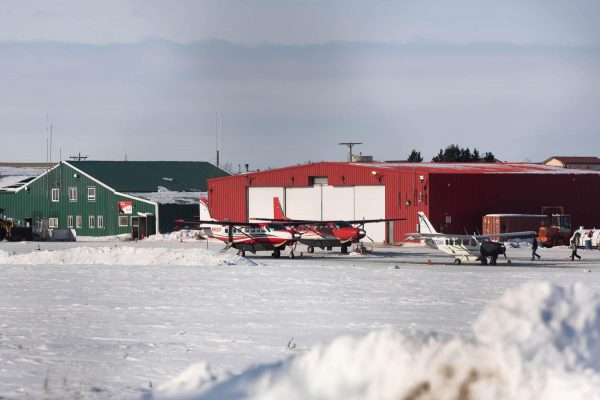
The number of villages in the Y-K Delta that are enacting travel restrictions in order to prevent the spread of the coronavirus has been growing by the day. KYUK knows of over 20 villages that are telling their residents not to leave and outsiders not to enter, but how are these villages enforcing those restrictions? Three Y-K Delta villages shared three different approaches.
“It’s not going to work 100 percent, but at least we are trying to slow it down,” said Toksook Bay Tribal Administrator Robert Pitka. His village is mandating that anyone returning to the community quarantine themselves for 14 days. To help enforce that, Toksook Bay has created a quarantine task force. The task force will meet people getting off the plane and tell them that they need to go straight home and quarantine. So far, Pitka says that he’s the main member of the task force.
“I can’t check every plane, but I am working with the tribal police officers and we are doing the best we can to interdict airplanes,” Pitka said.
The task force won’t use handcuffs or force people to quarantine, but Pitka says that they will hand travelers instructions on how to quarantine and how to monitor for symptoms of COVID-19.
“That’s as far as we can go to prevent,” Pitka said.
Catch up on the latest coverage of coronavirus in Alaska
Other villages are stopping travel to their communities before people even get on the plane. Hooper Bay tribal administrator Mamie Tinker says that her village’s policy is: “No outsiders are to enter the Native Village of Hooper Bay without approval.”
“Outsiders meaning, like, people who work for AVCP, OCS, AVEC,” Tinker said. “They need to ask us for permission first before coming into Hooper Bay. And the only way they could come here is if it’s an emergency.”
Hooper Bay is coordinating with both RavnAir and Grant Aviation to screen passengers. She says that the airlines are asking travelers if they are residents of Hooper Bay. If they aren’t, the companies are calling the village to see if they have permission to come.
“They’ve been calling here and they’ve been pretty good about that,” Tinker said. “We’ve turned some people away already since last week. Someone from AVEC wanted to come and fix a line, but it wasn’t an emergency.”
Other villages are dealing with the problem of being accessible by ice road. Kwethluk is just a short drive away from Bethel via the frozen Kuskokwim river, but City Manager and Incident Commander Boris Epchook is not going to let COVID-19 enter the community via car or snowmachine.
“We’re setting up various security checkpoints through the perimeter of this community,” Epchook said.
Epchook says that he has village police officers manning all of the primary access roads into Kwethluk 24/7 until at least April 20.
“If they’re not from this community, they’re not going to come in,” Epchook said.
Epchook says that if they are from Kwethluk and returning from medical travel, they’ll be allowed back in and told to quarantine for 14 days. But there won’t be any guards making sure that they stay home.
“It’s really up to them to at least adhere to that request,” Epchook said. “Because we’re trying to prevent something from coming into this community.
Toksook Bay, Hooper Bay, and Kwethluk have enacted measures to enforce their travel restrictions, but the leaders in all three villages are also asking people to please respect their policies, which they say are there to protect the communities.




